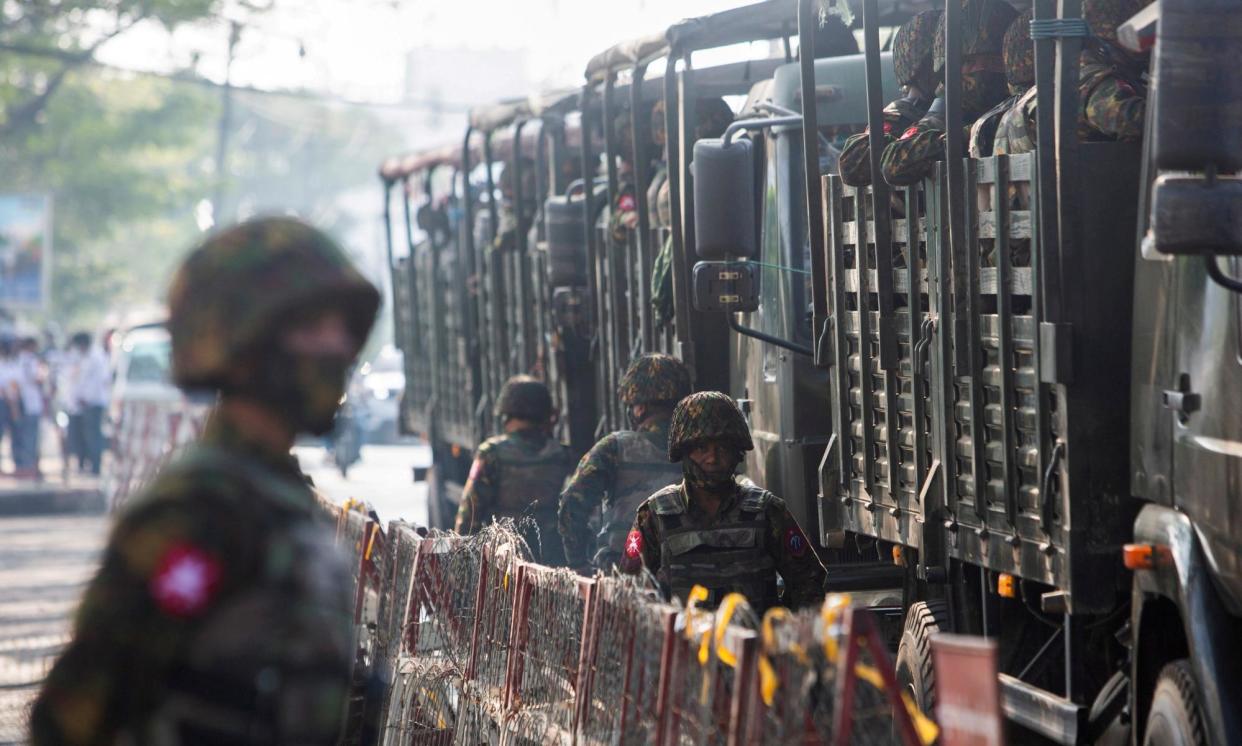‘We will turn the gun on the military’: hiding out against conscription in Myanmar

The interviewee, 27, lives with his wife and 15-month-old son in an industrial area of Yangon. Until last month he was working in a garment factory. He is among the millions of people who could be conscripted under a law due to be enforced in mid-April by the military junta. He, like many across the country, is desperately searching for a way to escape.
The military, which is fighting against anti-coup groups, is widely opposed by the public and has been accused of war crimes against its own people. Two-thirds of the country is gripped by conflict.
In my area, on the outskirts of Yangon, there used to be a lot of people still outside, late into the evenings, even until 9pm. But since the military announced the mandatory conscription law, the roads are deserted by 6pm. People are afraid they could be kidnapped by the military [and forcibly enlisted]. There have been many abduction cases in Yangon. I am afraid to go out even in the afternoon. There are very few people around.
Related: Three years on from Myanmar’s military coup, the junta is struggling to assert control
The military has already lost the war, and lost control [of the country]. There have been a lot of military deserters and they need more people. But they will never give arms to the [conscripted] people; it would be dangerous for them. They want to use the people as human shields, that’s why they are using this law now. It’s like their last, final bullet. They are losing and have no other way or idea to regain control.
I, and also other garment workers that I know, refuse to serve for the military. We will not do that. If we are forced to join the junta, we will turn the barrel of the gun on the military, not the people.
Many people in my area will leave their jobs in the factories and go back to their home villages. Those village areas are also military-controlled, though, and it’s not the case that they are safe from conscription there either. But families have a mindset – if we die, at least we will die together. They feel a little bit less worried if their families are together.
I still cannot decide what to do. I look at social media, where there is a lot of advice [from activists], but I won’t make decisions based solely on that. There are a lot of junta messaging from infiltrators.
I have discussed [with other workers] going to an area of Myanmar that’s controlled by the anti-coup resistance groups. If I joined a resistance area, I would prefer to do underground campaigns or help with logistic support that doesn’t relate to guns. But if I go to a resistance area, I won’t be able to find a job, and the resistance groups cannot feed my family. That’s why I’m considering going somewhere [across the border] where there is work.
Leaving the country officially is impossible because it requires me to get a passport, and that is extremely expensive at the moment [due to demand, and brokers charging high fees].
We cannot sleep well. We don’t have enough income, we don’t have proper jobs and we feel unsafe. We’re scared. I urge my wife to sleep, otherwise she might not be able to breast-feed.
I left my job as a garment worker last month because it had become unsafe for me. I am a labour rights activist, and I used to create a campaign among the workers if their pay was deducted or they were abused. The factory owners brought me into their office and said actions could be taken against me.
[Factory owners] will often say that if workers don’t comply with their demands they will call the junta officials.
My bosses were indirect in their threats. [I believe] they set up a fake Facebook profile in my name, using my pictures and adding my friends. It expressed support for the People’s Defence Forces [rebel groups]. This could lead to life in prison, or a death sentence.
I am working as a daily labourer, doing carpentry work. My parents are elderly. I used to support them but now I cannot. We are living hand to mouth. We don’t have a big lump of money to spend on transport. I will sell the things I own if I have to, like my mobile phone, and use that for travel expenses.
I would bring my wife and son with me. Both of us worry more about our son rather than ourselves. I know it will not be safe travelling to the border on the roads.
Interview edited for brevity and clarity


